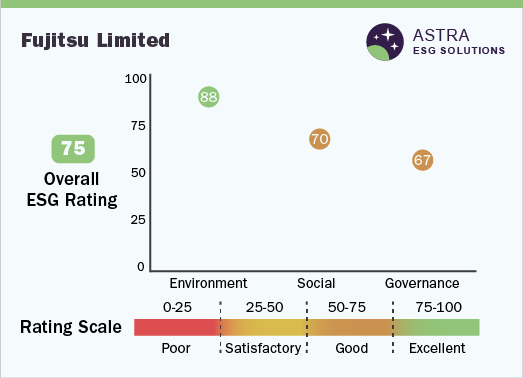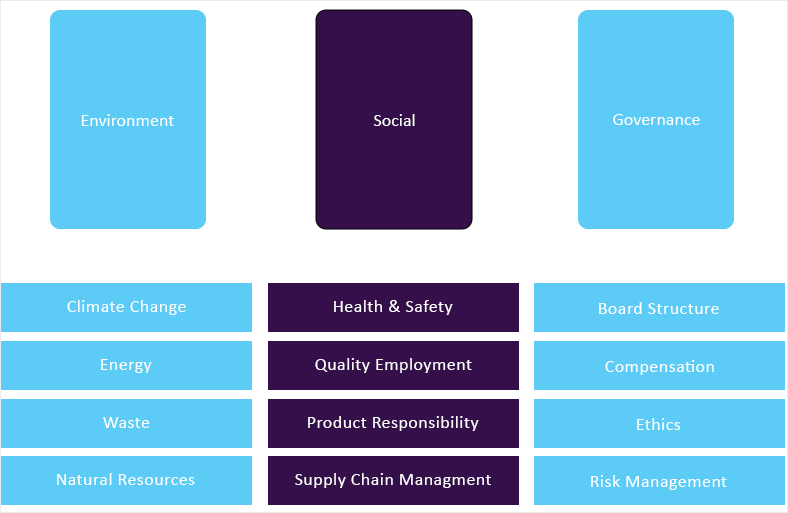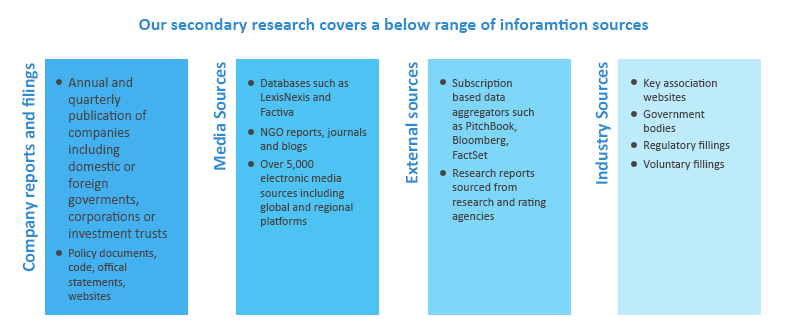Compliance, ESG Challenges & Framework, ESG Trends
- Report Summary
- Methodology
- Request for ESG Consultation
Environment, Social and Governance (ESG) at Fujitsu Limited
Fujitsu Limited is a Japanese multinational information and communications technology equipment and services corporation, established in 1935. It is the world’s sixth-largest IT services provider by annual revenue.
The company has been focusing on sustainability due to effective due diligence and a better investment decision for the company as well as relevant stakeholders and closely aligned with the United Nations’ Sustainable Development Goals (UN SDGs). The Fujitsu Group promotes its Sustainability activities based on the Fujitsu Way. To strive for global effectiveness, the company has reviewed material issues across the Group based on materiality analysis and has established a framework called “Global Responsible Business”. This has been classified by the following seven issues, human rights and DE&I, well-being, environment, compliance, supply chain, occupational health and safety, and community.
ESG Trends
Fujitsu Limited aims to enrich and continuously improve positive health culture where its employees can work to their full potential, both in mind and body. The company values the importance of its people and will strive to enable them to succeed in their own personal development and growth. The “FUJITSU Climate and Energy Vision” is a Medium- to Long-Term Environmental Vision for 2050 which clarifies the role we will play in tackling global climate change as well as the future outcomes we hope to realize.

Fujitsu Limited will work to achieve zero carbon emissions from its own operations by 2050 and contribute to climate change adaptation as well as a de-carbonized society through technologies supporting digital transformation. In terms of occupational health and safety, Fujitsu Limited aims to maintain a safe and comfortable working environment and promote employees’ mental and physical health in every workplace. The company achieved zero occurrences of serious accidents in 2021 and is implementing health and safety-related management reviews at the global level which are conducted once a year to improve safety.
Future of ESG at Fujitsu Limited
In 2021, Fujistu Limited generated a revenue of USD 27 billion. The company envisions various aspects including sustainability as one of the main agendas, with promising innovation and product development side supporting sustainability, the company has a favorable future ahead.
Research methodology
Grand View Research (GVR) employs a holistic and robust research methodology focused on delivering precision. Our ESG key issues are selected following a thorough materiality analysis run by our taxonomy committee. We examine leading business journals relevant to the industry sector and where applicable references are made to a range of sources including regulatory agencies, trade associations, company filings, white papers, and analyst reports during the due diligence on data aggregation. In addition, a recurring theme that remains central to all our research reports remains data triangulation which aims to dive into the market from thematic context, regulation, and industry benchmarking, including SWOT analysis.
Eligibility Criteria and Company Selection
Each public company is curated by our senior researchers following a comprehensive study of their business involvement around a specific theme. The involvement extends to subsidiaries based on at least 50% holding by the parent company. Following this, we analyze fundamental financial indicators, including revenue and market capitalization to ensure a diverse set of companies that fairly represent the sector are included. Additionally, GVR researchers ensure the disclosure level of each company across the material ESG key issues.
Scoring Methodology
Each ESG metric is assigned a specific weight based on its relevance across sectors. Below are the aggregated weights across pillars, which are derived from each metric.
| Environment | Social | Governance |
| 40% | 30% | 30% |
GVR’s proprietary ESG score is calculated using a weighted average method at:
• Key issues level
• Pillar level
• Company level and,
• Theme level
Data Mining
Data is obtained and collated from diverse source points. The data collected is continuously cleansed to ensure that only validated and verifiable sources are analyzed. In addition, data is also mined from a large number of in-house syndicated research reports inventory as well as through paid databases and premium content. During this research report, we conducted multiple primary interviews across the globe supported by our Primary Research Panels through the delivery of a mix of paid and unpaid interviews. We also send and receive responses from a wide section of industry participants through a carefully crafted and comprehensive survey questionnaire. We triangulate these data into quant models and generate qualitative insights. Evolving industry dynamics that shape drivers, restraints, and pricing are also gathered. As a result, the published content includes proprietary data and meaningful insights.
Fundamental ESG data:
GVR’s ESG taxonomy committee maintains the framework and ensures it is updated quarterly considering market updates and relevance. Framework includes 65+ fundamental ESG metrics that are identified following a thorough materiality assessment. Below is GVR’s ESG Level-I framework:

Alternative ESG data:
GVR also analyzes macro-economic factors that impact or drive the growth of respective sectors. This includes
• Deep dive analysis of policy and regulatory landscape that has potential towards shaping the future of businesses
• Innovation quotient of a sector to gauge prospective evolution of a theme and related opportunities
• Investment scenario, including mergers & acquisition, funding and other deals to assess the investment appetite for a particular theme
• Other market activities, including market size, growth forecasts among others.
Information sources

